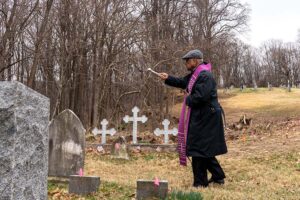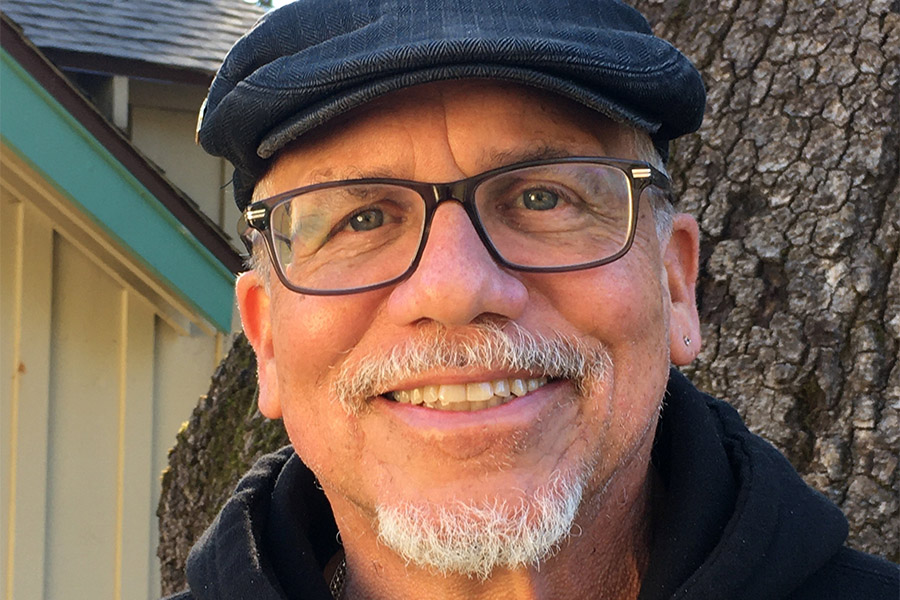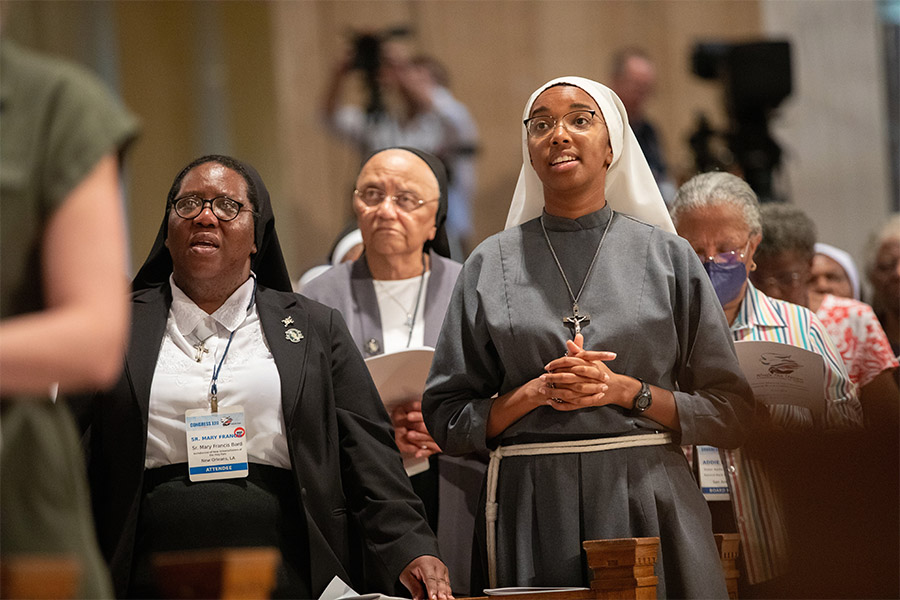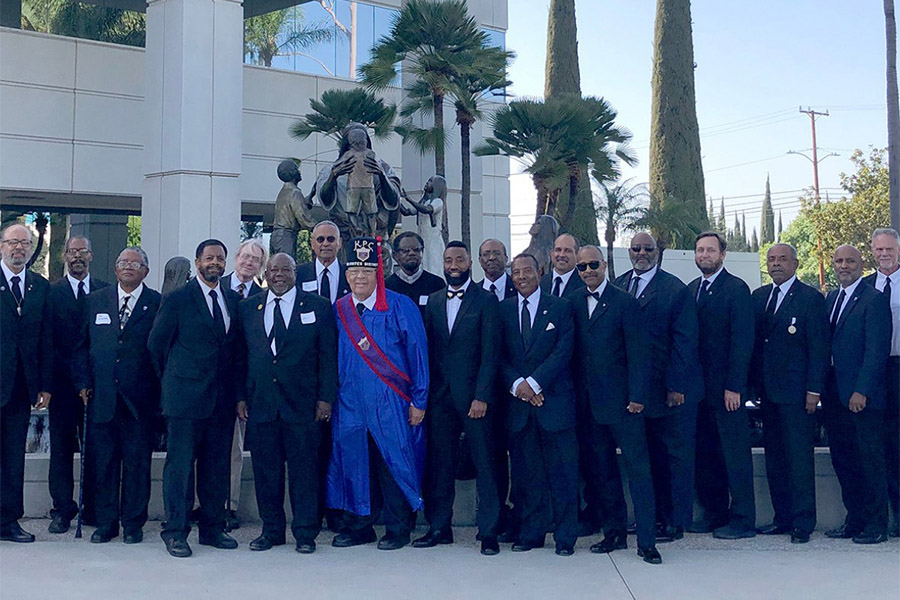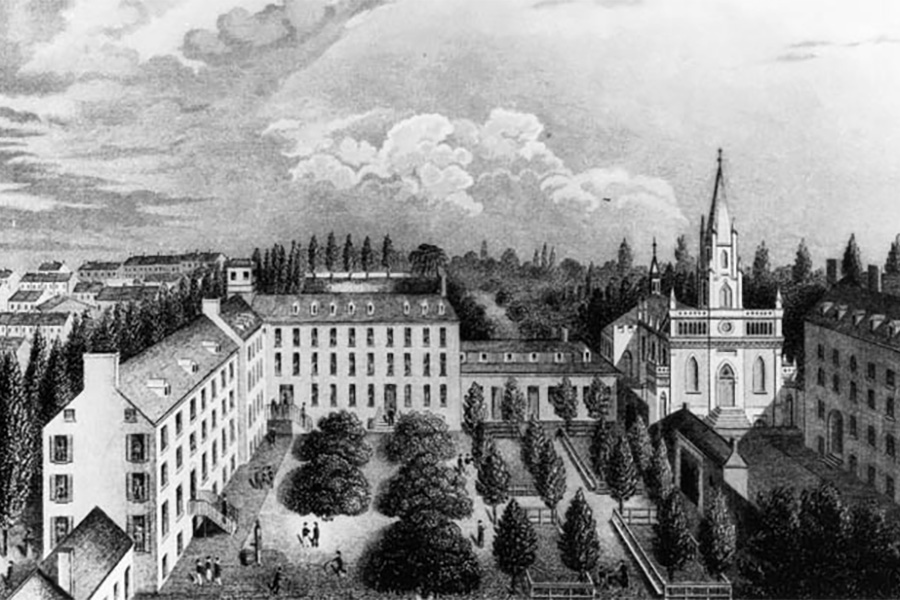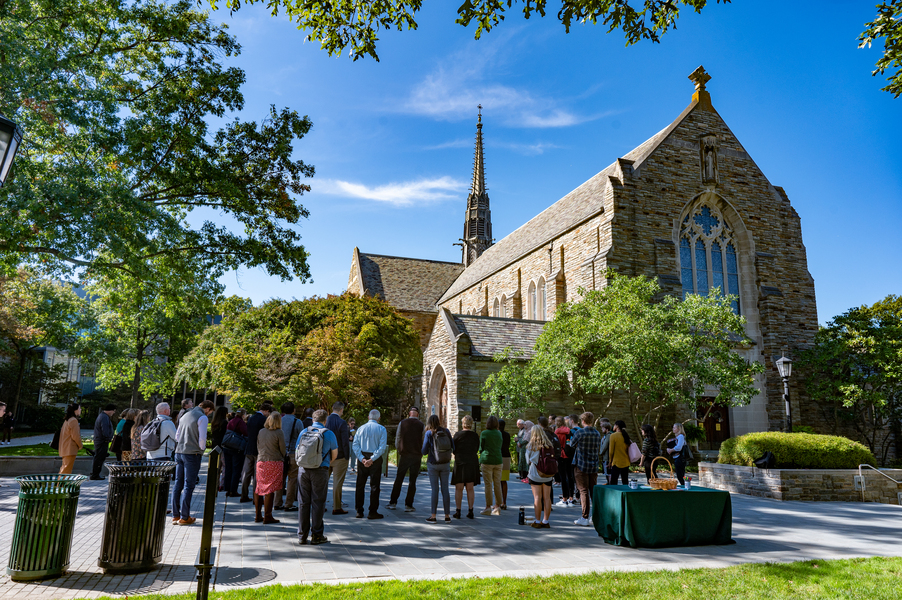BOWIE – Just following a snow flurry the morning of Feb. 25, a tent with seats for about 100 people was put up among gravesites on the property behind Sacred Heart Parish’s chapel in Bowie for an afternoon prayer service honoring the departed. Those in attendance, including more than 100 people standing outside the tent, gathered near a field and a hillside that were dotted with little pink and orange flags that represent an anomaly, stones or possibly grave markers discovered by archaeological research since the new year began.
Previously, the property was on one of the plantations owned by members of the Society of Jesus, the Jesuits, in Maryland in the 1700s and 1800s, and enslaved people who worked at that plantation may be buried in unmarked graves on the grounds of the parish cemetery.
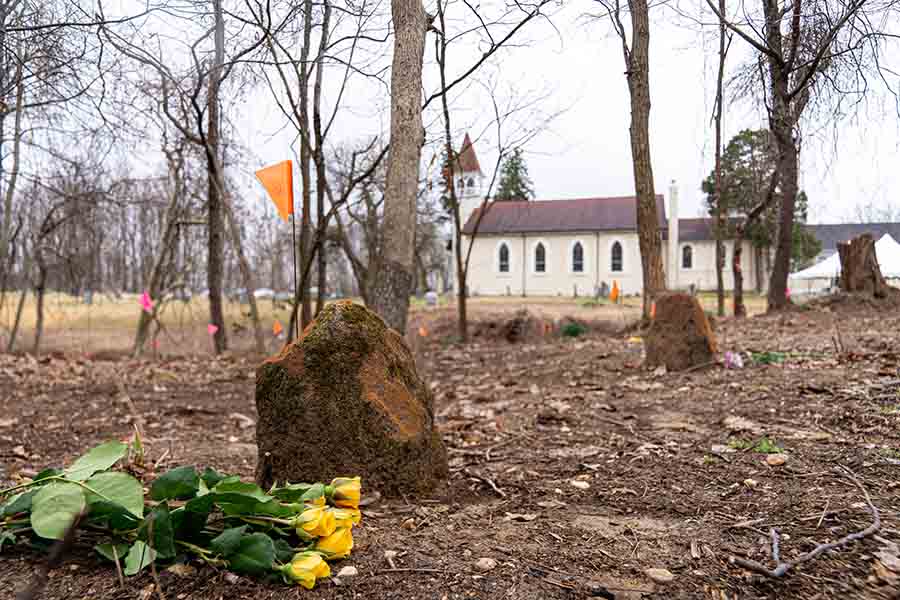
Washington Cardinal Wilton D. Gregory led the ceremony, which was titled a “Prayer Service to Bless a Portion of the Parish Cemetery for African-Americans Buried There,” and was attended by members of the parish and community, as well as descendants of the area’s enslaved. Descendants wore small black ribbons pinned to their coats that read “forever in our hearts.”
Members of the Archdiocesan Gospel Choir began the event by singing “Amazing Grace.” In his homily, Cardinal Gregory explained the significance of the prayer service, and how there is still work ahead to acknowledge the history of the Catholic Church’s involvement in slavery.
He noted that day’s reading from the Gospel of St. John included the word “loss,” which is often associated with death. But he pointed out that “Jesus told us that he was sent so that no one would be lost.”
“What we are doing today is helping give life to those Gospel words. We are trying, to the best of our ability, to allow the people whose lives were bound up in slavery and whose death mattered little to those who survive them, we are trying to make sure that their lives are not lost, but more importantly, that their memories are not lost,” Cardinal Gregory said.
Baltimore Archbishop William E. Lori participated in the prayer service, along with members of the clergy including Father Ronald Potts, the pastor of Sacred Heart Parish, and Father Michael Russo, the parochial vicar there. Maryland Delegate Adrian Boafo, who represents District 23 (Prince George’s County) read the first reading from the Book of Wisdom 3:1-6, 9, which includes the phrase, “The souls of the just are in the hand of God.”
Before the prayer service, Cardinal Gregory and church and parish representatives had a private meeting with descendants and community members.
In his homily, the cardinal noted, “Today, a lot of us who came to hear the conversations that took place in the chapel were reminded in vivid language that there is a lot of work that needs to be done so that the lives and the identity and the dignity of the people who were once in shackles will be held in honor by those of us who remain.”
Concluding his homily, Cardinal Gregory said, “Jesus said he came so that none of those who were given to him would be lost. We believe that, and we will continue to work to make sure that those people in this ground and in other grounds, once owned by the church, once held slaves by the church, will not be forgotten, overlooked or neglected, and none of them will be lost.”
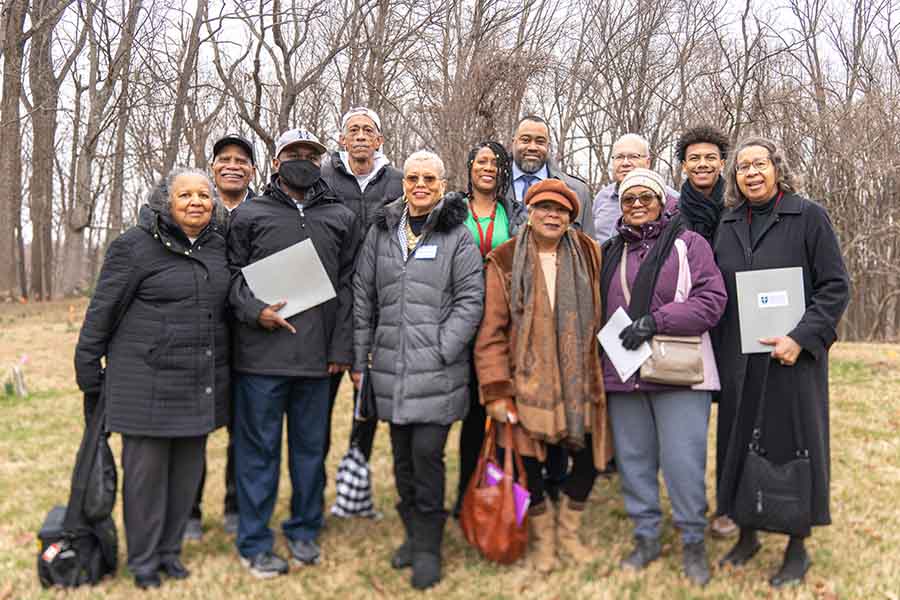
Following the homily, the cardinal went to bless the gravesites with holy water. Then began the pouring of libations. Deacon Darryl Kelley, who serves at St. Philip the Apostle Parish in Camp Springs gave attendees a brief background on the ritual of libations.
“The pouring of the water libation is an essential African ceremonial tradition. It is a way to pay homage to the ancestors,” Deacon Kelley said.
Descendant Mélisande Colomb took the podium following Deacon Kelley’s remarks. She asked everyone to respond with “asé,” a word from the West African language Yoruba that encompasses the concept of a force that leads to change. Colomb then explained how they were going to pour a cool, clear water libation onto the ground.
Descendants at the event were encouraged to say the names of their ancestors out loud. Names that could be heard included Taylor, Queen and Hawkins.
After the prayer service, Colomb said her ancestors include both the enslaved Queen and Mahoney families, as well as members of enslaver families.
Colomb currently works at Georgetown University in Washington with the Laboratory for Global Performance and Politics. Her family was part of the 1838 sale by the Maryland Society of Jesus of 272 enslaved men, women and children to Louisiana plantation owners that helped ensure the financial survival of Georgetown College. Although Colomb grew up in Louisiana, she has since found cousins in the Maryland area. She said she is not Catholic.
“No, I didn’t leave the faith. The faith did not accommodate Black Catholic families during human trafficking schemes. So those who were Catholic here in Maryland were left without resources to practice their faith in Louisiana. Many of them, many Black Catholics do not understand or connect with the reality that they are Black Catholics because they were enslaved by enslaver Catholics,” Colomb said.
Colomb said she hopes people take away “a sense of ownership and responsibility and obligation. To stand in the truth, to learn the truth, to separate from past beliefs, and embrace the future. And know that we are responsible in the present for what the future becomes.”
Irving Gaither is a lifelong Maryland resident, local historian and descendant who attended the prayer service. He said he has been doing genealogy research for his family for about 15 years.
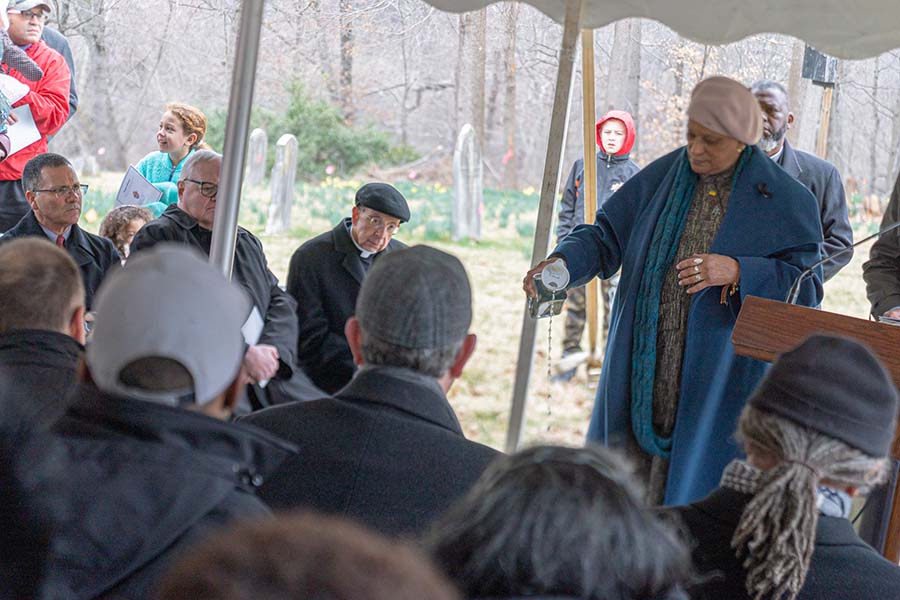
“[I came] just to recognize and pay homage to my ancestors, of which I have found five of them who were born on this property and at least two or three of them who actually died here,” Gaither said.
Gaither is related to the Hawkins, Harrison and Queen families. He explained that he is connected to all three families due to Black enclaves that were formed as freed enslaved people moved away together.
“One particular [enclave] that’s very connected to this property is Queenstown in Southern Maryland,” Gaither said. “There are just hundreds, if not thousands, of descendants whose family members moved to Queenstown. I have family on both my mother’s and father’s sides who grew up and live there. My mom grew up there. My dad’s family is there. That is how we’re multiply connected to this location.”
Although Gaither grew up Methodist, Catholicism has been in his family.
“My grandmother used to fry fish every Friday. She was a Methodist. I asked her, ‘Why do you fry fish?’ She said, ‘That’s when your grandfather brings it home.’ But he worked in Baltimore, he could have brought home fish every day, but they fried it on Friday, so it was a clue. I always knew there was a connection to the Catholic Church. I simply didn’t know what it was,” Gaither said.
Moving forward, Gaither hopes that the area becomes an educational site for future generations to learn about this history.
“My ask to my state representatives and my representatives on Capitol Hill was for the property to be, or the graves, to be kept where they are, to be preserved and for there to be an educational space here,” Gaither said. “To really tell the stories of them and how there was this acceptance of enslavement in this country. The State of Maryland created laws that made it happen. A number of religious institutions, not just the Society of Jesus, not just the Roman Catholic Church, bought into this process and allowed it to happen. So we just want to tell that history as well.”
While serving as the lector at the service, Kevin Porter recited several prayer intentions, including, “For the parish community of Sacred Heart, that the blessing of the graves of enslaved persons and their descendants in the parish cemetery may bring healing and comfort to the descendants of those buried here, and to the whole parish community.”
Porter is well known in the local community as a point of contact for those interested in learning the history of their ancestors and genealogy. Porter himself is a descendant of the Queen family and told the Catholic Standard, newspaper of the Archdiocese of Washington, that he has been connecting families not only in Maryland but across the country, since 2009. His focus on White Marsh – what the property was called while owned by James Carroll who sold the plantation to the Society of Jesus – started in 2016.
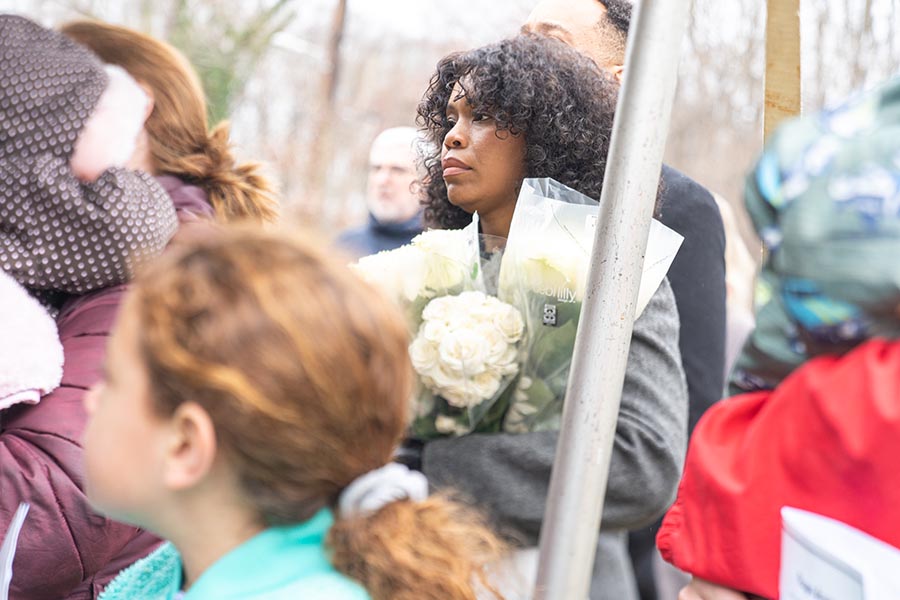
“[Connecting families] is the most gratifying part of what I do. A lot of the families here were brought together by my initial research. I knew about my connection to White Marsh, but I didn’t know the extent of Jesuit enslavement. Descendants from Louisiana reached out to me because of our DNA connections and some of the archival work that I’ve done. That’s the most important part of this, bringing us together,” Porter said.
His interest in learning about his ancestral connection to the Queen family led him to the Sacred Heart chapel.
“My third-great-grandparents were married here, Louis and Hattie Queen,” Porter said. “I discovered that their ancestors are buried here in one of these unmarked graves. Then I discovered that their ancestors were enslaved here since the early 1700s. That knowledge led me to do more research, and I’ve been able to connect with other descendants throughout the country.”
Porter hopes events like the prayer service help raise awareness of their fact-finding efforts.
“I’m hoping that even descendants of enslavers can look in their attics, and if you find mention of enslaved, reach out. Try to find descendants, you may have information that other descendants of enslavement are looking for. That’s what I want the country to take away,” Porter said. “This is important. This is American history and we can’t right the wrongs, but we can move forward together and correct the history, to tell the truth about the foundation of this country.”
Porter was onsite during the previous clean-up days at the property to help identify burial sites.
“I was initially overwhelmed, and as we continue our clean-up efforts, we continue finding more stones. It’s really emotional. This is just the beginning. This is a 2,000-acre plantation, so the work has just begun,” Porter said.
Also attending the prayer service was Jesuit Father Timothy Kesicki, who works with the Jesuit Conference of Canada and the United States and directs the campaign for the Descendants Truth & Reconciliation Foundation. He said he first met descendants of those enslaved by Jesuits when he was president of the conference.
“I was asked to give an apology on behalf of the Jesuit order, which took place at Georgetown University in April of 2017,” he said. “Then a group of descendants largely connected to the sale of 1838, wrote to the (Jesuit) superior general in Rome … and they asked him to respond to the sale of their ancestors in Jesuit slaveholding.”
This prompted a series of events, which resulted in the creation of the foundation. According to its website, the Descendants Truth & Reconciliation Foundation provides “moral, intellectual, and financial support” to descendants of the enslaved.
“At the time we began the process, there were three different descendant groups,” Father Kesicki said, noting that with the help of an outside facilitator from the Kellogg Foundation, representatives of the Jesuits and Georgetown University and descendants “came together and created a partnership.”
Although the Jesuits’ involvement in the sale of enslaved people dates back to the 1800s, this work toward supporting descendant families and learning more about the legacy of slavery has become more apparent in recent years. Father Kesicki said this is due to the “power of proximity.”
“Jesuits have always known their history of slaveholding. They’ve always known it. But it wasn’t until 2016 through the work of genealogists that we met living descendants and that changed everything,” Father Kesicki said. “When you meet living descendants, it’s a different reality, and you’re now face to face with your history. Many of these descendants are Catholic, especially many of the ones who were part of this 1838 sale. They came to realize, ‘Oh my God, we’re Catholic because we were owned by Jesuits in the Church.’”
As far as the next steps, Father Kesicki said that while there are many, creating a charitable foundation has been very important.
“[Descendants] said, ‘You sold our ancestors once, or you owned our enslaved ancestors.’ We don’t want to sell them again. We don’t want to personally profit. We want you (the descendants) with us to invest in something greater to help heal this country of this painful, sinful history,” Father Kesicki said.
He said that events such as the prayer service are an important component in understanding the emotional history of the enslaved.
“The more proximate you are to history, and in the presence of living descendants, it grounds us in what happened. But it’s not like we’re just looking at something from the past in memorializing, that history is still living today. Racism is one of the huge remnants of that history. Many of the injustices that still plague us as a nation are connected to this history. So how is this history informing our understanding of mercy, equality, justice – all these very rich Catholic virtues?” Father Kesicki said.
Following the service, attendees walked around the property and visited both the visible and unconfirmed gravesites.
Read More Racial Justice
Copyright © 2023 Catholic Review Media
